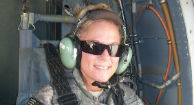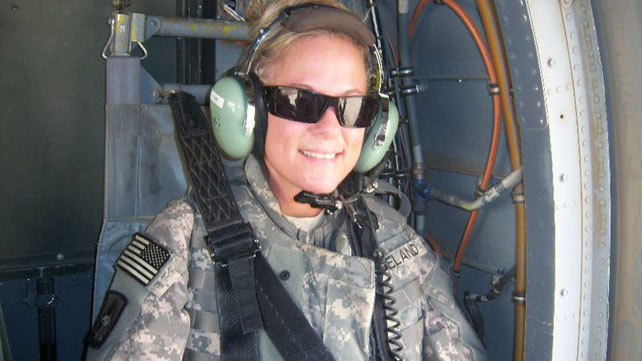In an exclusive interview with Healthline, war veteran Kara Moreland discusses her fight to heal the wounds from combat as well as harassment.

Like so many who go off to war, Kara Moreland brought the conflict home with her.
She returned from Iraq with the sounds of incoming mortar and the mental exhaustion that came with making sure everything was in the right place and everyone was accounted for.
Her logistics position in the Army National Guard demanded her mind work lightning-fast even during times when others would be too scared to think.
But all that took its toll.
Last month a psychologist diagnosed Moreland with post-traumatic stress disorder, or PTSD.

The disorder has made headlines this past week during the trial of “American Sniper” murder defendant Eddie Ray Routh.
Routh, a former Marine, is accused of shooting and killing Chad Littlefield and Chris Kyle, a former Navy SEAL credited with being one of the best shots the U.S. military has ever had.
Kyle is the subject of “American Sniper,” a film starring Bradley Cooper up for best picture Sunday at the Academy Awards.
It is the classic tale of conflict and a commentary on what deployments do to the men and women who serve their country.
Moreland brought back not only the typical scars from a war zone but also the mental abuse she said she suffered from a former boyfriend assigned to oversee her during a humanitarian mission to Panama.
Although both incidents took place while she was in the National Guard, Moreland is also a Marine veteran, having served three years after high school.
Related News: Scientists Delve Deep Into the Brain Seeking the Source of PTSD »
Marine, Mom, Married and Divorced
Moreland, 43, met her husband in the service. They married and had three children but later divorced. She decided to serve her country again in 2007 because it would provide her children with certain benefits. However, Moreland’s deployments left her unable to cope with everyday life when she returned home. She turned to alcohol and became someone she had never known before, and certainly not someone she wanted her children or mother to see.
Today she is more than 100 days sober, receiving treatment for her drinking atThe Discovery House, a residential detox center in Los Angeles. She shared her story in an exclusive interview with Healthline.
“The drinking began after Iraq, but then it escalated after Panama, when a lot of things happened,” she said. “I would down it as fast as I could at the end of the day because my head had been tortured all day long.”
Dr. Walter Thomas, medical director of The Discovery House, said the agitation and anxiety Moreland describes is part of a hyper arousal that can occur in people with PTSD.
Some begin to try to numb those feelings with alcohol. Others use drugs as a method of avoidance and zoning out.
For Moreland, the alcohol helped her shut off the horrific experiences that kept replaying in her mind.
“Did I see somebody blow up right in front of me? No. Were they shooting at us? Yes,” she said of her first deployment, when she was unable to ever phone her children because of the sounds of sirens and shelling.
And while the Iraq flashbacks were bad, she said her humanitarian deployment to Panama proved to be far worse.
Related News: PTSD Symptoms Put Women at Greater Risk of Diabetes »
Physically Assaulted, Mentally Tortured
According to a diagnosis provided by Moreland to Healthline from a psychologist at a military health clinic in California, the soldier reported she was “physically assaulted and mentally tortured by a high ranking service member” including “strangulation and psychological/emotional torture/manipulation.”
She also said her ex-boyfriend repeatedly threatened to kill himself.
“He made a huge scene at the airport in Panama,” Moreland said. “He said he was going to go back into the field and blow his brains out.”
Certain sounds do remind her of her deployments, but those sounds aren’t always related to coming under attack.

“I would hear helicopters and think my ex was going to jump out of the helicopter as he always threatened to do,” Moreland said.
She said she repeatedly complained about the ex-boyfriend’s behavior to superiors, but nothing was done to stop it.
The final straw in Panama was when she became ill with a high fever and was airlifted to a hospital. The scary part began upon discharge.
“Here I was with three men I didn’t know … they didn’t send along a female soldier … after I was released from the hospital at 1 a.m., half-dressed,” she recalled. “We sat in a car on the side of the road, half-dressed, because they didn’t want to wake up the commander and ask him what to do.”
“It was terrifying in Iraq. We would get mortared, we’d hear ‘incoming’ and then hear them hitting,” she said. “I was in such robot mode and that’s how I got through it. I didn’t realize when I came home that things would haunt me. I could have died and my kids wouldn’t have had a mother.”
Related News: Veterans Being Treated With Telepsychiatry »
What Is PTSD and How Pervasive Is It?
Although “American Sniper” was the top movie in the country during its first few weeks at the theaters, some movie-goers may not realize just how pervasive PTSD is.
According to the U.S. Department of Veterans Affairs (VA), between 11 and 20 percent of veterans who served in Operations Iraqi Freedom and Enduring Freedom have PTSD in any given year. For the Gulf War (also known as Desert Storm) about 12 percent of veterans in a given year will have a PTSD diagnosis.
One study showed that among Vietnam War veterans about 30 percent reported PTSD at one point during their lifetimes.PTSD can occur after traumatic exposure to violence, such as combat, physical assault, or sexual assault. Women are more than twice as likely to develop PTSD as men. About 10 percent of the general female population develops PTSD at some point.
Civilians and even children can develop PTSD as well. Traumatic events such as a terrorist attack or even a serious car accident can cause PTSD, according to the VA.
Stories like Moreland’s are not uncommon in the military, but they seldom get told publicly. Women often report experiencing both sexual harassment or sexual assault along with combat-related trauma.
According to the VA, people who are seriously injured, or who believe their life or the life of a loved one may be in danger, or who have had some kind of intense physical reaction such as crying or throwing up are more likely to develop PTSD. But the likelihood of developing PTSD is further aggravated by other mental health problems, a poor support network, the recent loss of a loved one, or drug and alcohol abuse.
Addiction Doctor: PTSD Often Overlooked
When Moreland arrived at The Discovery House she knew she had hit rock bottom and needed help. Her mother had found her passed out in the bathtub after downing a bottle of vodka. The kids had seen the ambulance come when she blacked out in the past.

Yet like so many people with PTSD, getting involved in her own recovery proved difficult. She sat in the corner at first wearing sunglasses and a hoodie.
Thomas, medical director of The Discovery House and board certified in addiction medicine, said people with PTSD usually have other medical issues, whether it be mental illness or substance abuse.
When addiction centers don’t spot the PTSD, they may mislabel a patient as hopeless or not trying hard enough. In fact, it may be avoidance, Thomas said.
“They are perceived by the recovery community … as narcissistic, know-it-alls, not connectng with their peers or the program, very controlling, very defensive and emotionally constricted,” he told Healthline. “In private practice, when someone like this comes in you call it a heart-sink patient. Because no matter what you do for them nothing works. If you don’t treat or diagnose the condition and treat the two together, that creates a tremendous cascade of issues. It becomes a cascade of negativity and hopelessness.”
Read More: Famous Faces of Alcoholism »
VA Doctor: Treatment Must Be ‘Highly Individualized’
Rachel Yehuda, Ph.D., is director of the Traumatic Stress Studies Division at the Icahn School of Medicine at Mount Sinai in New York City as well as the director of the Mental Health Patient Care Center and PTSD Research Program at the James J. Peters Veterans Affairs Medical Center in the Bronx.
She stressed there is no one-size-fits-all solution for treating people with PTSD and the other conditions that usually co-exist with it.
“Where is the fire burning the fastest? This has to be done on a highly individualized basis,” Yehuda told Healthline.
“It would be less than ideal to follow a pre-set algorithm that says first do this, first do that,” she added. “What we have to do is recognize that there are often a lot of things to do at once that sometimes cannot all be done at once. A comprehensive treatment plan needs to be established with input from different kinds of mental health specialists. That is what health care for veterans is all about.”
Moreland said she hopes to rebuild her life and create a place similar to The Discovery House, where she was even allowed to bring her terrier-poodle mixes Slim and Shady.
Any time a mental health issue is thrust into the national spotlight, whether by Hollywood, a real-life news event, or both, the takeaway should be to seek treatment no matter how hopeless things seem, Yehuda said.
“People need to be encouraged to seek treatment even if they feel that there is an overwhelming amount of problems to solve,” she said. “It’s like if you go into a house that needs fixing up. If there’s just one room that needs redecorating, say the kitchen, you can just tear it down and build a new kitchen. But when there are problems everywhere you look, some people will give up on that.”
